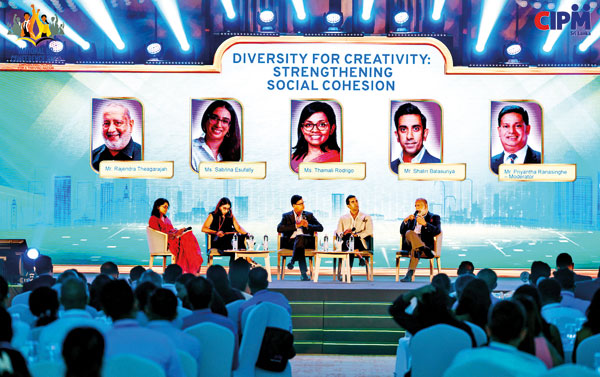Beyond the Echo Chamber: Why Diversity is Sri Lanka’s Ultimate Strategic Asset
View(s):In a nation standing at a crossroads of economic recovery and social reconciliation, the dialogue surrounding diversity and inclusion has never been more critical. Moving beyond its frequent characterisation as a Western corporate buzzword, a recent high-level discussion framed diversity as a cornerstone for Sri Lanka’s future prosperity and unity. The second day of the International HR Conference, hosted by the Chartered Institute of Personnel Management (CIPM) Sri Lanka on June 3rd at the Monarch Imperial in Kotte, convened a powerhouse panel of business leaders to dissect the theme, “Diversity for Creativity: Strengthening Social Cohesion.” The conversation that unfolded was a masterclass in shifting the narrative from diversity as a compliance metric to diversity as a strategic, non-negotiable imperative for innovation and national healing.

The panel, expertly moderated by CIPM President and Siam City Cement Lanka’s Chief People Officer, Priyantha Ranasinghe, featured a formidable lineup of minds: Rajendra Theagarajah, the astute Independent Non-Executive Chairman of First Capital Holdings PLC; Sabrina Esufally, the dynamic Managing Director of Hemas Consumer Brands; Tamali Rodrigo, Partner and Head of Restructuring and Corporate Governance at KPMG Sri Lanka & Maldives; and Shalin Balasuriya, the visionary Co-Founder and Group Director of Spa Ceylon Ayurveda Wellness. Together, they argued that for Sri Lanka to thrive, its boardrooms, product lines, and social fabric must begin to reflect the rich tapestry of its people.
The Unassailable Business Case: Diversity as a Performance Driver
Priyantha Ranasinghe initiated the discourse by acknowledging a crucial gap: while conversations around Diversity, Equity, and Inclusion (DEI) are gaining traction in Sri Lanka, the nation’s corporate sector lags significantly behind global benchmarks in implementation. He set a powerful tone, urging leaders to transcend performative gestures and embed DEI into the very DNA of their corporate strategy.
Rajendra Theagarajah, drawing upon decades of experience in the banking sector, immediately gave this call a tangible form. He argued that intentional diversity, particularly in leadership, is a direct catalyst for superior decision-making. “The quality of a decision fundamentally improves when it is informed by a variety of perspectives,” he asserted. He shared a compelling case study from his career where the strategic recruitment of young people from rural communities to serve those same communities resulted in a more empathetic, effective, and ultimately profitable service model. The lesson was clear and profound: “Diversity must mirror your stakeholders.” For a business to truly understand its market, it must first understand the people within it.
Shalin Balasuriya, whose brand Spa Ceylon has taken Sri Lankan wellness to the global stage, echoed this sentiment. He emphasised that authentic market intelligence is not born from spreadsheets and data analytics alone. “Cultural insights don’t come from data—they come from people. From lived experiences,” he explained. He contended that building an internal team that reflects the consumer base is the first step to genuine innovation. Such an inclusive environment, he argued, not only sparks creativity but also cultivates profound team cohesion and loyalty—a crucial asset in any competitive industry.
For Sabrina Esufally, DEI is not a “nice-to-have” but a core driver of market growth. “If you treat diversity as a compliance, tick-box exercise, you will never unlock its true, transformative value,” she warned. She detailed how Hemas Consumer Brands strategically repositioned its innovation pipeline by asking a simple yet revolutionary question: “Who is the market not solving for?” This inquiry led them to the “margins,” where immense growth opportunities lay hidden in plain sight. By identifying and addressing the unmet needs of underserved populations—such as the lack of access to affordable sanitary products in rural areas or disparities in oral healthcare—the company unlocked new revenue streams while simultaneously fostering greater equity. “Growth happens at the margins,” Esufally declared, positioning inclusion as a powerful engine for business expansion.
Bringing a rigorous consulting perspective, Tamali Rodrigo underscored that in the realm of professional services, cognitive diversity is not merely advantageous—it is essential. “Diverse teams consistently deliver better, more robust solutions. It’s not optional for success,” she stated. However, she cautioned that building such teams requires a structured, deliberate approach. This includes actively managing resistance to change, codifying inclusive policies, and—critically—holding teams accountable through DEI-related Key Performance Indicators (KPIs). “Inclusion isn’t a special project,” Rodrigo insisted. “It must be embedded in how we work every single day.”
HitAd.lk is the best and biggest mobile phone market in Sri Lanka, and we guarantee you will find what you need here from our extensive listing of mobile phones for sale in Sri Lanka. Whether it’s a budget-priced smartphone for communication, or higher end features with advanced connectivity, there are many different options from which to choose from on our site!


